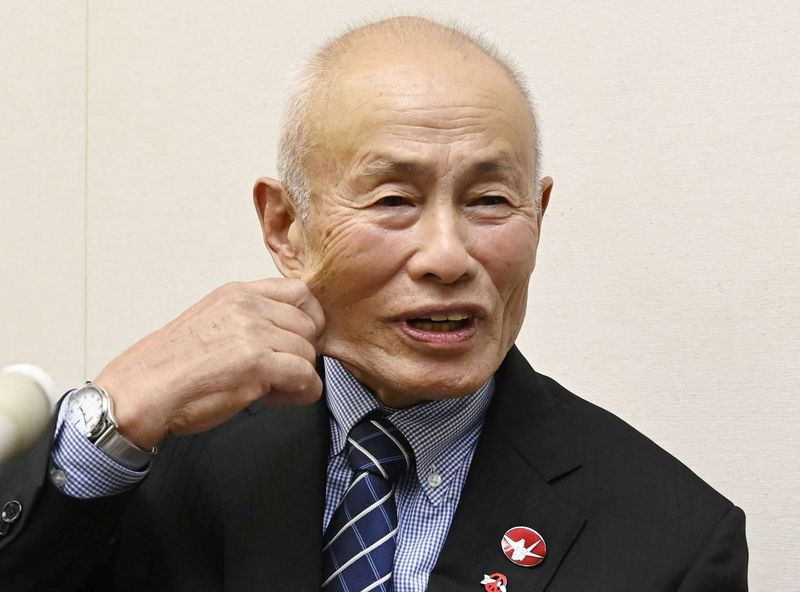Japanese atomic bomb survivors’ group Nihon Hidankyo wins Nobel Peace Prize
2024.10.12 14:59
By Gwladys Fouche, Chang-Ran Kim
OSLO/TOKYO (Reuters) -Japanese organisation Nihon Hidankyo, a grassroots movement of atomic bomb survivors from Hiroshima and Nagasaki, won the Nobel Peace Prize on Friday, in a warning to countries that have nuclear weapons not to use them.
Many survivors of the only two nuclear bombs ever to be used in conflict, who are known in Japanese as “hibakusha”, have dedicated their lives to the struggle for a nuclear-free world.
The Norwegian Nobel Committee said in its citation the group was receiving the Peace Prize for “its efforts to achieve a world free of nuclear weapons and for demonstrating through witness testimony that nuclear weapons must never be used again”.
“The hibakusha help us to describe the indescribable, to think the unthinkable, and to somehow grasp the incomprehensible pain and suffering caused by nuclear weapons,” the committee said.
“I can’t believe it’s real,” Nihon Hidankyo co-chair Toshiyuki Mimaki told a press conference in Hiroshima, site of the Aug. 6, 1945 atomic bombing during the closing stages of World War Two, as he held back tears and pinched his cheek.
Mimaki, a survivor himself, said the award would give a major boost to its efforts to demonstrate that the abolition of nuclear weapons was necessary and possible and faulted governments for waging wars even as their citizens yearned for peace.
“(The win) will be a great force to appeal to the world that the abolition of nuclear weapons and everlasting peace can be achieved,” he said. “Nuclear weapons should absolutely be abolished.”
In Japan, hibakusha, many of whom carried visible wounds from radiation burns or developed radiation-related diseases such as leukaemia, were often forcibly segregated from society and faced discrimination when seeking employment or marriage in the years following the war.
“They are a group of people delivering the message to the world, so as a Japanese I think this is truly wonderful,” Tokyo resident Yoshiko Watanabe told Reuters, as she wept openly in the street.
There were 106,825 atomic bomb survivors registered in Japan as of March this year, data from the country’s health ministry showed, with an average age of 85.6 years.
WARNING TO NUCLEAR NATIONS
Without naming specific countries, Joergen Watne Frydnes, chair of the Norwegian Nobel Committee, warned that nuclear nations should not contemplate using atomic weapons.
“In a world ridden (with) conflicts, where nuclear weapons is definitely part of it, we wanted to highlight the importance of strengthening the nuclear taboo, the international norm, against the use of nuclear weapons,” Frydnes told Reuters.
“We see it as very alarming that the nuclear taboo … is being reduced by threatening, but also how the situation in the world where the nuclear powers are modernising and upgrading their arsenals.”
Frydnes said the world should listen to the “painful and dramatic stories of the hibakusha”.
“These weapons should never be used again anywhere in the world … Nuclear war could mean the end of humanity, (the) end of our civilisation,” he said in an interview.
Russian President Vladimir Putin has repeatedly warned the West of potential nuclear consequences since Russia’s 2022 full-scale invasion of Ukraine.
He declared last month that Russia could use nuclear weapons if it was struck with conventional missiles, and that Moscow would consider any assault on it supported by a nuclear power to be a joint attack.
This month, North Korean leader Kim Jong Un said his country would speed up steps towards becoming a military superpower with nuclear weapons and would not rule out using them if it came under enemy attack, while widening conflict in the Middle East has prompted some experts to speculate Iran may restart its efforts to acquire a nuclear bomb.
SECOND JAPANESE WINNER
Next year will mark the 80th anniversary of the dropping of nuclear bombs by the United States on Hiroshima and Nagasaki in August of 1945 that forced Japan’s surrender.
With the award, the committee was drawing attention to a “very dangerous situation” in the world, according to Dan Smith, head of the Stockholm International Peace Research Institute.
“If there is a military conflict, there is a risk of it escalating to nuclear weapons … They (Nihon Hidankyo) are really an important voice to remind us about the destructive nature of nuclear weapons,” he told Reuters.
Smith said the Committee had achieved “a triple strike”: drawing attention to the human suffering of nuclear bomb survivors; the danger of nuclear weapons; and that the world has survived without their use for nearly 80 years.
The award body has regularly put focus on the issue of nuclear weapons, most recently with its award to ICAN, the International Campaign to Abolish Nuclear Weapons, who won the award in 2017.
This year’s award also echoes those to Elie Wiesel in 1986 and Russia’s Memorial in 2022 by highlighting the importance of keeping the memory of horrific events alive as a warning to the future.

It is the second Nobel Peace Prize for a Japanese recipient in the prize’s 123-year history, 50 years after former Prime Minister Eisaku Sato won it in 1974.
The Nobel Peace Prize, worth 11 million Swedish crowns, or about $1 million, is due to be presented in Oslo on Dec. 10, the anniversary of the death of Swedish industrialist Alfred Nobel, who founded the awards in his 1895 will.








